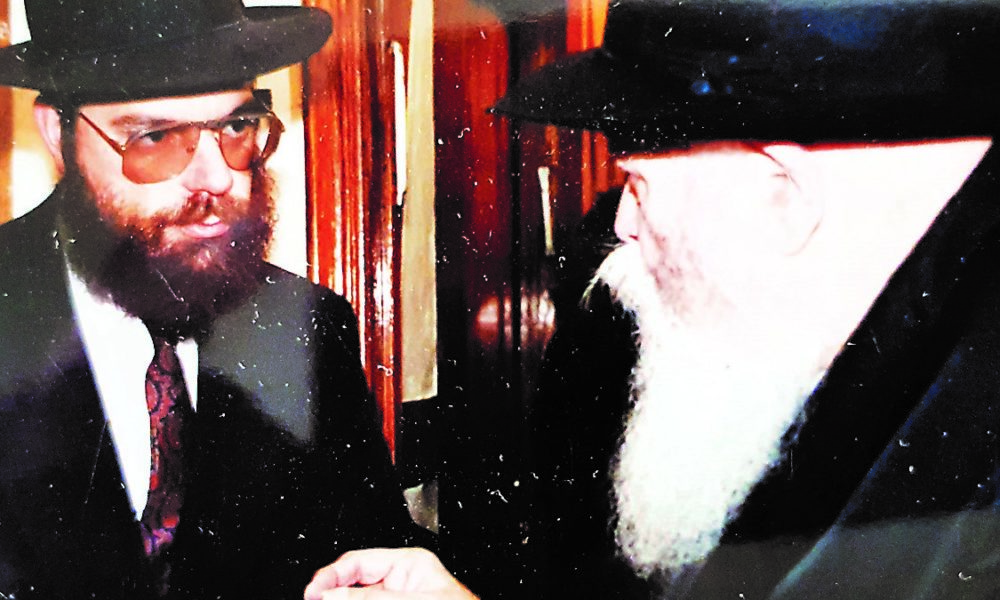Banner
Remembering the Rebbe who saved SA Jewry

In the early 1980s, the Lubavitch movement in South Africa was given a blessing by Rebbe Menachem Mendel Schneerson (the Rebbe) to build a new school in Johannesburg. It was bold for the movement considering that things were volatile politically, the community was leaving in droves, and existing Jewish schools were struggling financially.
Communal leadership expressed concern about the timing of such a school when the “community was dwindling”, it said in a letter to the Rebbe.
He responded by saying that an existing situation need not be accepted as irreversible, and called for an all-out effort to reverse the trend. A declining community, he said, need not mean one should curtail the building of further educational facilities that catered to each child’s individual needs.
Today, that school, Torah Academy, is one of the largest Jewish schools in the country, and soon after the correspondence with the Rebbe, the King David Sandton campus was built.
This week marks the 29th anniversary of the Lubavitcher Rebbe’s passing. He died on 3 Tammuz, observed this year on Thursday, 22 June, a day of introspection by Jews worldwide who continue to read and study his prolific works and feel his holy presence in their lives.
Since his passing, his influence on world Jewry has grown exponentially, including in South Africa. His kind, open face greets you on billboards in cities throughout the world, from Balfour Park and Rosebank to New York City and London, and further afield. His inclusive teaching of love and unity, and a steadfast belief that every person in the world has a vital role to play in G-d’s creation, has touched millions, Jews and non-Jews, from celebrities, politicians, and business leaders to labourers and Torah scholars.
The Rebbe was a global visionary and scholar who had an extraordinarily enduring confidence in the future of South Africa as a place where Jews could flourish and thrive. This belief, say Chabad rabbonim, has been a source of comfort for a community often torn by seemingly insurmountable political and economic upheavals.
“For the longest time, the Rebbe was confident about the future of South Africa as a place where Jews would find security and have a good life and because of this, a large number remained,” said Rabbi Mendel Lipskar, the head of the Lubavitch Foundation.
“Yes, some left, but because of the Rebbe’s blessing and assurances, the ones who stayed were given a tremendous sense of permanence.”
Today, there are 70 shluchim (emissaries) throughout South Africa, and about 20 Chabad shuls, with Torah Academy Pre-school being the largest Jewish pre-school in the country, he said.
In a series of illuminating letters to communal leadership at the time, the Rebbe expressed the vital importance of Jewish education and of a diversified system that reflected the pluralistic nature of the community.
“The Rebbe saw that no one size fits all and today, South Africa has tremendous educational facilities catering to the diverse needs of the community,” Lipskar said.
In his letters, the Rebbe said that virtually every Jewish community, including in South Africa, comprised a variety of groups, each with a distinct identity in terms of their traditions and heritage. “All of them existing and flourishing side by side contributed to the advancement of the Jewish community as a whole,” he wrote.
“The Rebbe saw potential growth everywhere, and his vision of Jewish unity, kindness, and love of all humanity was something he taught over and over again, urging all of us to search for this,” Lipskar said.
Rabbi Yossy Goldman fondly recalled awe-inspiring Sundays at 770 Eastern Parkway, Crown Heights, when the Rebbe stood for hours outside his room giving out a dollar to each of the thousands of visitors seeking his blessing and advice.
“The Rebbe made everybody his agents for the mitzvah of charity. Every single conceivable type of Jew could be seen in the queue and be given his blessing. Very often non-Jews of all varieties would go as well,” Goldman said. On a recent visit to the Rebbe’s ohel (resting place) Goldman saw an African American woman praying there who told him she regularly went there to pray.
“His influence spread far and wide,” he said.
Goldman believes the Rebbe saved South African Jewry at a time when the country was in turmoil in the late 1970s, crippled by uncertainty in the dying days of the repressive apartheid regime.
“In those days, there was virtually no Jewish family that wasn’t grappling with the vexing dilemma of emigration,” said Goldman.
“During this period of uncertainty, the Rebbe sent his rabbinical students to serve this community as his emissaries, giving the country a massive vote of confidence.
“He was completely dismissive of the perceived need to emigrate. There were no grey areas and no vague platitudes. He said clearly that we shouldn’t be afraid and we should carry on with our good work.”
In an article, Goldman wrote that the Rebbe’s continuous reassurances of confidence “spread like wildfire” throughout South Africa. He recalled how the Rebbe relayed a message to communal leaders via a consular official at the South African embassy saying, “The community shouldn’t pack up and leave, on the contrary, it should continue to build and develop Jewish schools, synagogues, yeshivas, mikvahs.”
“Today, the South African Jewish community is one of the best in the world,” Goldman said.
“There’s still a great future in South Africa,” Lipskar said. “People often think the grass is greener, but this country has great opportunities. Yes, it has its challenges, but so does everywhere else. The late Rabbi Bernhard once said, ‘Go home or stay home.’ If you have it in your mind that things will be fine, then they will be. It’s a mindset. The Rebbe understood this.”
Lon Ball
February 5, 2024 at 9:08 am
Rebbe was not a secular zionist! Jews should inhabit and teach the Entire Earth in his spirit of unity of mankind!
torahjews.org